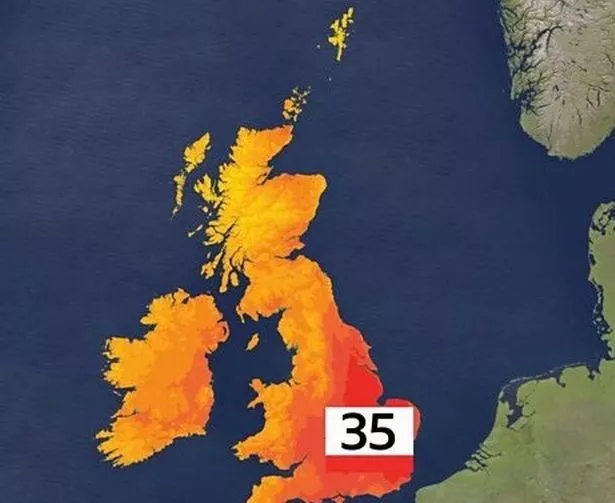
The United Kingdom has experienced its hottest day of the year, with temperatures reaching a blistering 34.8°C. This extreme heat, recorded in several parts of the country, marks a significant milestone in what has been an unusually warm summer, raising concerns about the effects of climate change and the challenges of coping with rising temperatures.
The 34.8°C reading, which was recorded in southern England, has shattered previous temperature records for the year. Residents in cities such as London, Cambridge, and Oxford felt the full force of the heat, with many areas seeing temperatures climb well above 30°C. The Met Office, the UK’s national weather service, confirmed that this was the highest temperature recorded in the country this year and one of the hottest days on record for the UK.
The extreme heat has prompted public health warnings, with officials urging people to take precautions to stay safe in the sweltering conditions. The NHS issued advice on how to avoid heat-related illnesses, such as heatstroke and dehydration, recommending that people stay hydrated, avoid direct sunlight during peak hours, and look out for vulnerable individuals, including the elderly and those with pre-existing health conditions.
Public transport systems across the country faced significant challenges due to the heat. Train services were disrupted as tracks expanded in the high temperatures, leading to delays and cancellations. In London, the Underground saw a surge in temperatures, with some stations reaching uncomfortable levels that made commuting a test of endurance for many. Air conditioning units in buses and trains struggled to keep up with the demand, leaving passengers sweltering during their journeys.

The heatwave also impacted businesses, particularly those in the hospitality and retail sectors. While some businesses saw an increase in foot traffic as people sought refuge in air-conditioned spaces, others struggled to cope with the demand for cooling products, such as fans and cold drinks. Garden centers and outdoor venues also experienced a drop in visitors as people opted to stay indoors to escape the intense heat.
Farmers and those working in agriculture faced their own set of challenges, as the high temperatures and lack of rainfall put additional stress on crops and livestock. Many farmers were forced to take extra measures to ensure that their animals stayed hydrated and cool, while others expressed concerns about the long-term effects of the heat on their harvests.
Environmentalists have pointed to the rising temperatures as further evidence of the urgent need to address climate change. The UK, like many parts of the world, has been experiencing increasingly hotter summers, with heatwaves becoming more frequent and severe. Experts warn that unless significant action is taken to reduce carbon emissions and mitigate the effects of global warming, such extreme weather events will become the norm rather than the exception.
In response to the heatwave, local councils and community organizations have been working to provide relief to those most affected by the heat. Cooling centers have been set up in some areas, offering a safe space for people to escape the heat, while volunteers have been distributing water and checking in on vulnerable residents. Despite these efforts, the high temperatures have still taken a toll on public health, with reports of an increase in heat-related illnesses and hospital admissions.
As the UK grapples with this record-breaking heat, the government has emphasized the importance of preparedness and resilience in the face of climate change. While the current heatwave is expected to subside in the coming days, the experience has served as a stark reminder of the challenges that lie ahead as the planet continues to warm.
The 34.8°C recorded on the UK’s hottest day of the year has not only tested the nation’s resilience but has also highlighted the urgent need for action to combat the growing threat of climate change. As temperatures rise, the UK—and the world—must adapt to a future where extreme weather events become increasingly common.
Leave a Reply